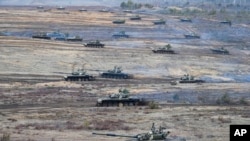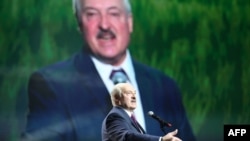LVIV, UKRAINE — U.S. intelligence expects Belarusian leader Alexander Lukashenko to throw in his 48,000-strong army into the war raging in Ukraine in the next few hours or days to reinforce Russia in its faltering invasion of Ukraine.
Up to now Belarus has been used as staging ground for Russian forces to strike at Kyiv from the north and only a few Belarusian special forces are believed to have participated in any fighting, but with Russia’s invasion encountering stronger resistance than the Kremlin might have been expecting, and with Kyiv still holding out, Russian leader Vladimir Putin appears to be turning to his longtime ally to boost the offensive.
The full involvement of Belarus risks another frontline opening up in the war with fears that Belarusian forces will not only reinforce the Russian siege of the Ukraine capital but will also strike more widely across Ukraine’s northwest and center, endangering Lviv, where tens of thousands of evacuees are trapped and waiting up to two days to get across the border to Poland.
Messages sent to NGOs and projects funded by the United States and drawing from the intelligence assessment warn: “Cities in the West are no longer regarded as safe.” NGO workers still inside Ukraine are being advised to seek shelter in border villages on the grounds that they are likely to be safer from missile strikes, which would likely target cities and bigger towns.
The message-alerts note: “borders are heavily congested but proximity to borders afford a ‘safe zone’ from missiles — strongly consider moving to border villages — accommodation will be an issue — please liaise with colleagues/project leadership to house-share along the Polish/Slovakian/Hungarian borders.”
Belarusian leader Alyaksandr Lukashenko has said previously his forces would not participate in any military action against Ukraine. On February 24 after a meeting with Putin, he announced had agreed to keep Russian troops stationed in Belarus. Since then, he has said Ukraine is losing the war and has offered to host peace talks.
Talks
Belarus said Monday that it has prepared a venue for talks between delegations from Ukraine and Russia. Ukraine has agreed to send representatives for the talks but was initially reluctant to engage because of the Belarusian role in the conflict allowing Russian forces to stage there and launch attacks towards Kyiv and north-east Ukraine.
Ukraine has vowed to give no ground at the talks, which come on the fifth day of the Russian invasion. Ukrainian President Volodymyr Zelenskyy says he was skeptical about the prospect of the talks in Belarus.
“I do not really believe in the outcome of this meeting but let them try so that later not a single citizen of Ukraine has any doubt that I, as President, tried to stop the war, when there was even a small, but still a chance,” he said in a message posted on Telegram.
U.S. officials told VOA that Lukashenko will likely bring push Belarus more deeply into the war depending on the outcome of talks between Russia and Ukraine.
The American intelligence assessment chimes in with warnings issued Sunday by Belarusian opposition figures that Lukashenko was preparing to enter the war fully. On Sunday voters in Belarus approved a constitutional reform that will allow the country to host nuclear weapons and to host Russian ground forces permanently.
The Belarusian election commission says that around 65% of those who cast a ballot voted in favor of the change, which would allow Russia to base nuclear weapons in the country. Belarusian opposition leaders have denounced the move as treasonous and say the vote was rigged.
The greater involvement of Belarus raises the prospect of clashes and missile strikes occurring very close to the Polish border, with the chance of a spillover of ordnance into Poland, warn some military analysts.
“As the Russian assault on Ukraine continues, Russian shelling and missile strikes have landed disturbingly close to the Polish-Ukrainian border,” notes Rob Dannenberg, a former chief of the CIA’s Central Eurasia Division, told the intelligence news outlet Cipher Brief.





















